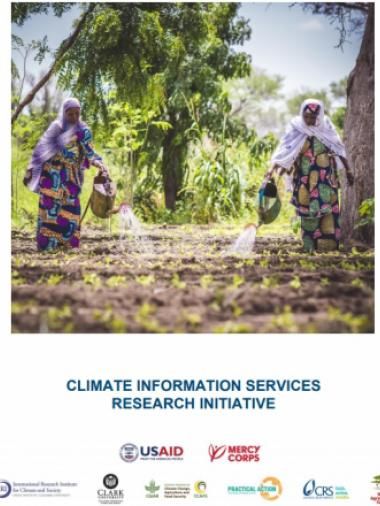Climate Information Services Research Initiative: Final Report

Throughout Sub-Saharan Africa, smallholder farmers are at the frontlines of an increasingly variable
and changing climate. Frequent and severe climate shocks and stresses threaten farmers’ lives and
livelihoods, challenging the role agriculture could play in promoting economic growth, food security,
poverty reduction, and community resilience. Timely, accurate, and useful farmer-focused weather and
climate information services (CIS) can lessen these vulnerabilities by informing decisions of smallholder
farmers to manage those climate risks.
Valuable research exists on the impact of climate variability and change on farmers and the types of
climate-related information farmers need for decision-making. However, critical gaps limit the
understanding of how climate information services can best meet the decision-making needs of
farmers, and the factors that most influence the effectiveness – delivery, uptake, and use – of climate
information services.
In response to these gaps, the United States Agency for International Development (USAID) funded
the Learning Agenda on Climate Services in Sub-Saharan Africa, which included the Climate
Information Services Research Initiative (CISRI) project. CISRI sought to generate knowledge and
evidence to inform the development of climate information services that effectively meet African
farmers’ decision-making needs in a variable and changing climate. This was accomplished through
desk research, field-based research, collaboration with local and national partners, and pilots of new
methodologies and approaches. The project was led by Mercy Corps in consortium with several
partners, including the Humanitarian Response and Development Lab at Clark University (HURDL),
the International Research Institute for Climate and Society at Columbia University (IRI), CGIAR
Research Program on Climate Change, Agriculture and Food Security (CCAFS), World Agroforestry
Centre (ICRAF), Practical Action, and Catholic Relief Services (CRS).
The research undertaken by the CISRI consortium focused on synthesizing and analyzing existing
knowledge on climate information services programs, and identifying gaps and inefficiencies in climate
information services systems. In addition, CISRI developed innovative approaches to strengthening
climate information services systems and evaluating the uptake and effectiveness of climate services.
The project highlighted that CIS in Sub-Saharan Africa will only succeed in addressing the risks created
by a variable and changing climate if users and their needs are involved as a critical component in all
aspects of the CIS system. Considering climate information services as a system in which users are one
of the vital elements is key for improving CIS moving forward. Otherwise, climate information services
cannot effectively benefit those who are most vulnerable to climate risks.
Through the CISRI project, the consortium generated research, methodologies, and learning to inform
how climate information services can best meet the decision-making needs of farmers, and the factors
that most influence its effectiveness. This will contribute to a better understanding of how to improve
the design of climate information services programs moving forward, ultimately advancing the impact
of future development investments on the livelihoods of farmers in Sub-Saharan Africa.
Citation
Blumenstock A. 2020. Climate Information Services Research Initiative: Final Report. CGIAR Research Program on Climate Change, Agriculture and Food Security (CCAFS).